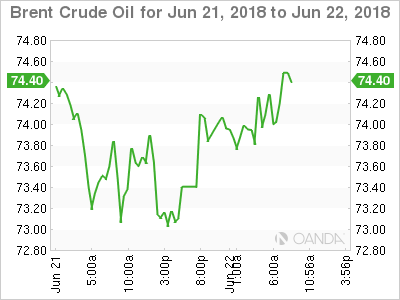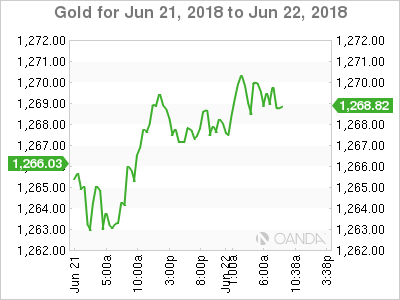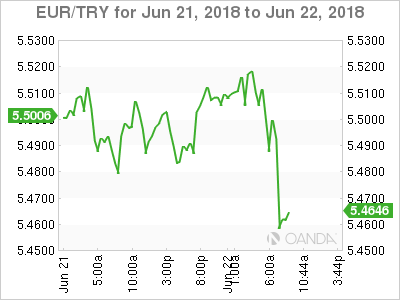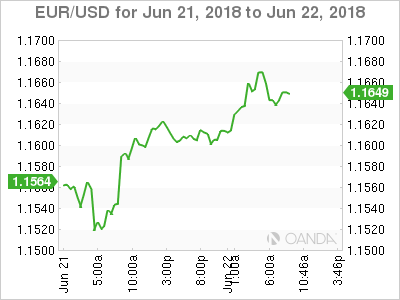Friday June 22: Five things the markets are talking about
Euro equities are on the rise, along with U.S stock futures, as Euro manufacturing and services data this morning beat analysts’ expectations, dragging along with it the EUR (€1.1667).
Crude oil prices start Friday better bid, after OPEC and its allies are rumoured to have reached a preliminary agreement on output, an increase in production of +1M bpd (see below) and this despite calls from Iran to boost output further.
Even some risk appetite is seen returning to the foreign exchange market, as EM currencies see a small rebound and the dollar falls slightly, benefitting from reports that a number of U.S officials are trying to resurrect trade talks with China before Trump’s tariffs come into effect in July.
Fixed income dealers see U.S Treasury prices fall, backing up yields, while in Europe; Greece’s creditors have struck a deal to ease repayment terms on some of the nation’s loans. This is supporting Greek sovereign bonds, while Italian debt has also steadied after yesterday’s plunge.
On tap: CAD core-retail sales and CPI data (08:30 am EDT), OPEC two-day meeting begins in Vienna.
1. Stocks mixed reaction
In Japan, the Nikkei share average dropped overnight as shares of automakers fell after Germany’s Daimler cut its profit forecast citing tariff concerns yesterday, while weaker U.S data is dampening some investor enthusiasm. The Nikkei fell -0.78% and the index is down -1.46% on the week. The broader Topix shed -0.33%.
Down-under, Aussie financials rallied after ANZ Banking Group doubled its share-buyback programme, but the overall market remains under pressure from Sino-U.S trade tensions. The S&P/ASX 200 index fell -0.1%, but still posted its best weekly performance in nearly three-years with a gain of +2.2%. In South Korea, the KOSPI rallied +0.83%.
In Hong Kong, the benchmark stock index ended slightly higher overnight, but posted its biggest weekly loss in three-months amid escalating trade tensions. The Hang Seng index rose +0.2%, while the China Enterprises Index lost -0.2%. For the week, the Hang Seng lost -3.2%, its worst weekly performance since late March.
In China, stocks edged higher overnight, but posted their worst weekly loss since early February, on lingering worries over a full-blown trade war. The blue-chip CSI 300 closed up +0.5%, while the Shanghai Composite Index gained +0.5%. For the week, SSEC tumbled -4.4%, while CSI300 slid -3.8%.
In Europe, regional bourses trade higher across the board following the preliminary PMI data out of Europe (see below).
U.S stocks are set to open in the ‘black’ (+0.5%).
Indices: STOXX 600 +0.5% at 382.8, FTSE 100 +0.5% at 7597, DAX +0.4% at 12556, CAC 40 +0.7% at 5353, IBEX 35 +0.8% at 9781, FTSE MIB +1.0% at 21891, SMI +0.8% at 8523, S&P 500 Futures +0.5%

2. Oil prices rise as OPEC meets, gold higher
Oil prices have rallied +1% this morning as OPEC struggles to agree a deal to increase output to compensate for losses in production.
OPEC begins its two-day meeting in Vienna today, together with non-OPEC oil producers to discuss output policy.
Benchmark Brent crude is up +75c a barrel at +$73.80, while U.S light crude is +60c higher at +$66.14.
Saudi Arabia and Russia want to raise output, but some other OPEC members, including Iran, have opposed this.
Consensus expects OPEC to announce an increase in production of +500K to +600K bpd, which would help ease tightness in the market but not enough to create a glut.
A more relaxed policy will push Brent towards +$70 a barrel, while restrictive measures will support crude oil back towards +$80.
Ahead of the U.S open, gold prices have inched a tad higher after hitting a six-month trough Thursday, as the U.S dollar pulled back from its 11-month peak on profit taking. Spot gold is up +0.2% at +$1,269.46 an ounce. On Thursday, bullion touched +$1,260.84, its lowest since Dec. 19, 2017. U.S gold futures for August delivery are +0.1% higher at +$1,271.50 per ounce.
Note: The yellow metal is heading for a -0.7% decline for the week.

3. Italian bonds finds support
Borrowing costs in Europe’s third largest economy, Italy, are falling this morning after yesterday’s sharp bond selloff, although investor sentiment remains fragile.
News that Italy’s new anti-establishment government had appointed two-euro sceptics to head key finance committees in parliament resuscitated market concerns about the coalition’s commitment to the EUR.
Italy’s two-year bond yields are down -16 bps at +0.76%, while 10-year bond yields fell -8 bps to +2.67%.
Elsewhere, Mexico’s Central Bank (Banxico) raised its Overnight Rate by +25bps to +7.75% (as expected).
On Sunday June 24 is Turkey’s general election and it’s difficult to predict how the TRY and local assets may react after the vote.
Some investors will interpret Erodgan’s victory accompanied by a strong mandate obtained by his AKP as a source of political stability. Others will view such a result negatively, mainly due to concerns that the CPRT could be under political pressure to lower interest rates to maintain robust GDP growth.
Note: This comes at a time when the domestic economy is considered overheated – double digit inflation – and a wider current account deficit.

4. Dollar retreats from its 11-month highs
The USD continues to move away from its recent G10 currency price highs.
EUR/USD (€1.1667) is higher by almost +0.5% to again consider retesting the psychological €1.1680-00 level as this mornings Euro PMI surveys helped to dispel concerns of a prolong slowdown in the region and paint a stronger picture of Q2 activity after the weakness in Q1.
GBP (£1.3295) is building upon the BoE’s ‘hawkish’ hold yesterday. The pound benefitted as three out of nine BoE policymakers, including its chief economist, voted to increase rates.
In EM, investors eyes are on Sunday’s Turkey’s parliamentary and presidential elections. The governance system will switch over to an executive presidency – the market is waiting to find out how this will work in practice. Will the new president take control of the central bank and monetary policy? USD/TRY last trades flat at $4.7191, EUR/TRY is up +0.5% at €5.5052

5. Eurozone PMI’s pick up
Business activity in the eurozone picked up in June for the first month in five, which may suggest that the region is beginning to shake off a sluggish start to the year.
Euro data from Markit this morning showed that Eurozone manufacturing PMI and services PMI for June came in at 55.00 each, with services beating expectations of 53.6 and manufacturing in line – its composite PMI for the currency area rose to 54.8 from 54.1 in May.
ECB policy makers remain worried that the imposition of new tariffs on some items traded between the U.S and the EU could dampen confidence, making businesses wary of signing new deals and undertaking new investments.
